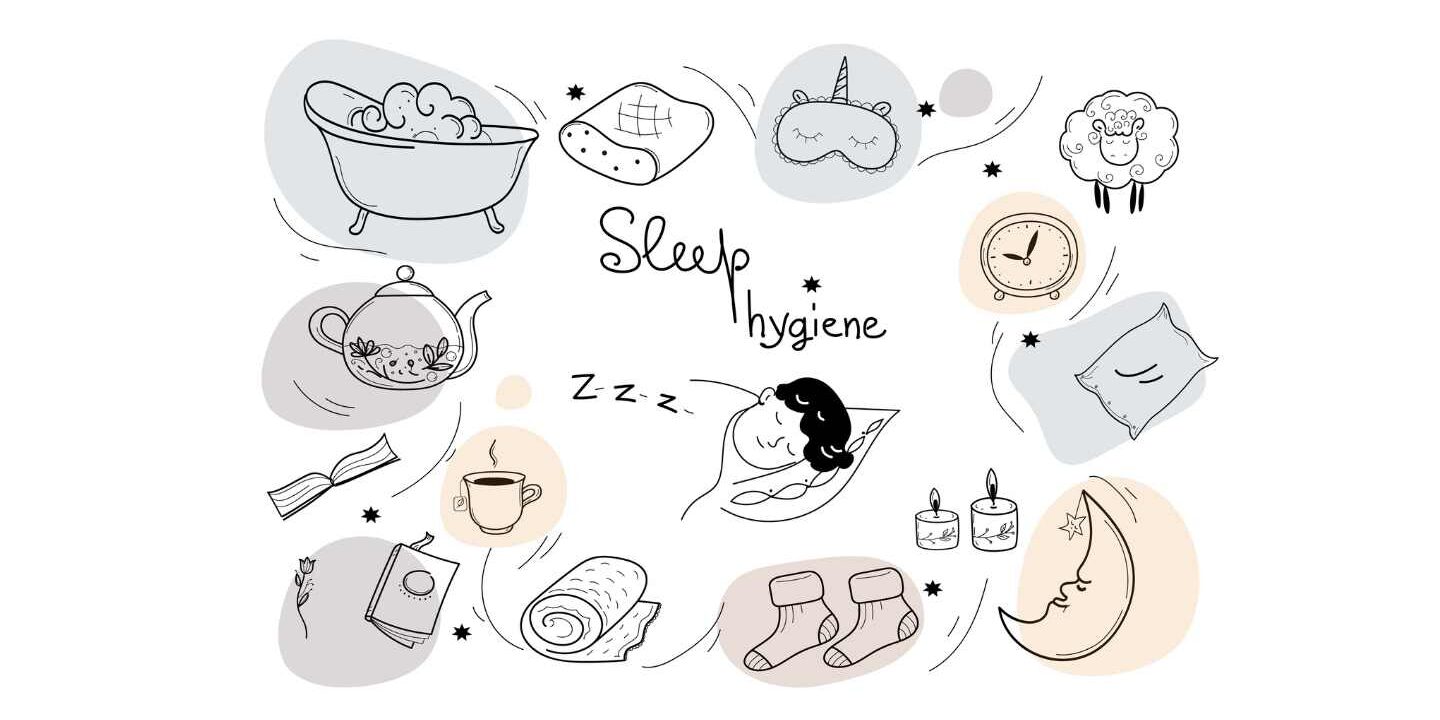Sleep hygiene is all the health maintenance that goes into keeping and maintaining your sleep system. We think of hygiene as cleanliness, but it’s more like daily maintenance habits that we do to prepare for sleep and give our bodies and brains every advantage to fall asleep and stay asleep naturally. We are born with and develop many excellent built-in systems that automatically take care of sleep, and we deserve to use this legacy for free.
How Does Sleep Hygiene Affect My Night’s Sleep?
The brain and body are programmed to expect nightfall and run programs of several predictable sleep cycles per night. These include blood flow changes, temperature changes, relaxation, wound healing and tissue repair, dreaming, and clearance of waste products in the brain.
What Is Considered A Good Night’s Sleep?
Most sources consider a good night’s sleep to be about 7 hours for adults and more for teens, with enough of both REM and deep sleep types over several cycles that get shorter as the night progresses to morning. Waking with a good cortisol surge from the adrenal glands in the morning completes the cycles and the night.
What Sleep Hygiene Practices Help Someone Get A Better Night’s Sleep?
- Reducing screen time before bed
- Reducing red tones on screens before bed
- Establishing a pre-sleep ritual before bed to prepare for sleep, such as laying out your clothes, turning down your sheets, fluffing your pillows, preparing your bedside or bathing.
- Turn off or move all devices with an electrical field in your bedroom.
- Lower the lights in your bedroom and whatever room you are in before bed
- Keep your work desk out of the bedroom if possible
- Brush and floss and waterpik your teeth and hair
- It often helps to clean up anything that produces anxiety like unwashed dishes or clothes before bed
- Consider different supplements for sleep taken in the morning and different ones at night
- Talk with your doctor about medication side effects and interactions that affect your sleep
- Lower the room temperature a little
- Eat smaller dinner and larger lunch
- Try to leave a few hours between your last meal of the day and your bedtime
- Use a light massager or hot pad on tight muscles for a few minutes before bed
- Getting a massage in the afternoon can really help that night’s sleep
- Use essential oils in the room like lavender
- Drink chamomile tea in the evening
- Measure your caffeine during the day and stop after noon
- Get a wrist or finger device that measures sleep cycles to see your patterns (yes this is electric but it can be discontinued when you get your sleep settled)
- If you have a CPAP, get it prepared, cleaned and ready for use at the bedside.
- Pets may need to be removed from the bedroom if they jump on and off the bed and disturb your sleep.
- Parasite assessment of stool can lead to discovery of protozoa, worms or dysbiosis that can affect sleep
- Typically people do not get up at night and eat. If you do, you may consider insulin resistance, thyroid or anemia issues.
- Absolutely pick a shift and try to stay on it. Rotating shift workers with schedules that change from day to night and back are shown to have sleep problems and even higher incidence of some cancers.
Does Napping Help or Hurt?
Napping is usually great. If you have a sleep deficit, napping can really help. If naps make it hard to fall asleep, you may need to keep them to 30-60 minutes.
How Does Diet Affect Sleep?
Indigestion can really throw off sleep cycles, dreams and recovery. Low carb diets have really helped my patients along with bile support. Eating a larger meal at lunch and a smaller meal at dinner can help.
What If I Have Sleep Apnea, Can Sleep Hygiene Help Me?
If the airways, sinuses and throat are swollen or throat muscles are not firing properly, there is less effect from sleep hygiene. Diets really help obstructive apnea if the root cause is swollen tissues and fatty tongue.
What About Supplements, Can They Help With Sleep?
Magnesium can be helpful for relaxation, stress and sleep, vitamin B5-pantothenic acid can help support adrenal glands, omega 3 oils and saturated fats also support the adrenals. German chamomile, passionflower, and other herbal tinctures help, and homeopathic remedies help some people immediately, and they are safe for pregnant mothers and infants.
There are lab tests for adrenal hormones and for melatonin that can help assess these molecules that affect sleep. They are urine or saliva tests that measure the diurnal or circadian daily rhythm of cortisol over the course of the day. They often have 4 or 5 tiny collection vials taken at certain times of the day to measure the surges of cortisol. Learning how to balance the cortisol daily rhythms is important for stressed out people. You may be compensating well for stress or have exhausted and depleted cortisol output at different times of the day. The brain and adrenal glands can be balanced with food, supplements and stress management to aid in sleep.
When Should I Consult With My Doctor?
If you cannot find workable solutions, it’s a good idea to find an expert who can help. Less medication is always a guiding principle whenever possible. There is so much available in your hands to regain control of your sleep, and you will be amazed how many conditions just resolve or reduce with good sleep.
For more on sleep hygiene and sleep apnea, visit my YouTube channel here.
Or you can book a coaching session with Dr. Michael Pierce here.






